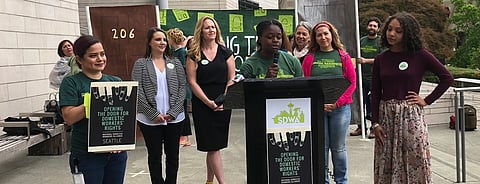Shaping the 21st Century Workers' Movement
by Rachel Lauter
Here in Washington, we have strong labor unions to help protect the gains workers have made since the first Gilded Age, and lead the fight to raise new standards in today's Gilded Age. But with the decades-long attack on organized labor, an anti-worker zealot in the White House, and recent Supreme Court decisions like Janus vs AFSCME, it is clear that we also need new models of building power for workers.
Working Washington and Fair Work Center, two strong worker organizations based in Seattle, are joining forces to advance worker and economic justice across Washington and beyond. By aligning the legal services, community education, advocacy, and organizing strategies of each organization, we will bring a comprehensive approach to supporting workers throughout Washington. We'll be a one-stop shop for low-wage workers, connecting them with efforts to change policies impacting their lives or with the legal services and support they need to achieve fair employment and get justice on the job.
When low-wage workers face problems at work, the best path for making changes to address those problems is not always clear. Sometimes their issues require legal solutions that enable them to stand up and enforce their existing rights at work. Other times their issues require organizing or political solutions to create new standards at work. By aligning our organizations, Working Washington and Fair Work Center will be able to support workers in finding the right solutions to their most pressing issues.
Working Washington is known for our groundbreaking campaigns to raise standards for workers, including leading the fast food worker strikes that led to $15 in Seattle, passing the nation's first secure scheduling ordinance, and winning a historic Domestic Workers' Bill of Rights that creates new standards for domestic workers long operating in the shadows of labor and employment law.
Fair Work Center is known for our community-based approach to workers' rights and enforcement of labor standards. Our deep relationships with nonprofit organizations in the region enable us to engage low-wage workers most likely to be victims of workplace violations, including low-wage women, people of color, immigrants and refugees, LGBTQ people, and young people
The new Seattle Domestic Workers Bill of Rights is a prime example of how Working Washington and Fair Work Center will collaborate to raise standards and ensure they are enforced. The Seattle Domestic Workers Alliance (SDWA) unites nannies, house cleaners, and other domestic workers across Seattle. Beginning in 2017, domestic workers established SDWA as a project of Working Washington, with support from Casa Latina, SEIU 775, and the National Domestic Workers Alliance. SDWA spent months talking to domestic workers about their issues and building a campaign that officially kicked off in December 2017. Following their successful kick-off, they spent the first half of 2018 organizing and building the support they needed inside and outside of City Hall to win the country's first municipal Domestic Workers Bill of Rights in July of this year.
Now all nannies and house cleaners in Seattle—whether they work for a private home or for an agency; whether they are full-time or part-time—will now be covered by the minimum wage law and receive meal and rest breaks (or compensation if their job doesn't allow for breaks, like caring for young children). More importantly, the bill creates a Domestic Workers Standards Board, which will include workers, employers, government, and community representatives and has the power to establish industry-wide standards on wages, benefits, training, and other issues. The new standards board is a breakthrough for workers' rights in Seattle and across the country because it creates a new model of collective bargaining led by women and people of color who have been too long excluded from other basic legal protections.
Going forward, Fair Work Center will be expanding our outreach and education efforts to include domestic workers so they fully understand their new rights under the law, and we will offer free legal services to support them if their rights are being violated.
While our organizations' work has mostly been focused in the Seattle area, our plan in coming together is to grow and expand our geographic reach to build power for more low-wage workers. With the housing affordability crisis here in Seattle, we think it is especially important to be able to meet low-wage workers where they are at, which is increasingly in cities and parts of King County outside of Seattle. We already have an ongoing presence in the Yakima Valley, and we are looking for new opportunities to collaborate and grow in that region as well. Down the road, we envision additional presence in South Puget Sound, Southwest Washington, and Eastern Washington, too.
We are excited about the new possibilities of coming together now, at a time when the economy is booming for some, while millions continue to struggle. Together we can accomplish more than either organization could on its own. And with your support, we will help shape the 21st Century workers' movement in our state and beyond.
Rachel Lauter is the Executive Director of Working Washington and Fair Work Center
Learn more about Working Washington and Fair Work Center.
Featured Image: A nanny speaks in favor of the domestic workers bill of rights outside of Seattle City Hall. (Photo Courtesy Fair Work Center)
Help keep BIPOC-led, community-powered journalism free — become a Rainmaker today.


